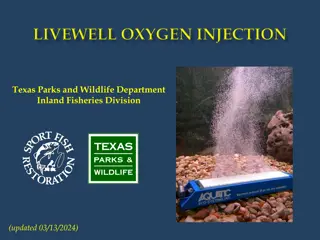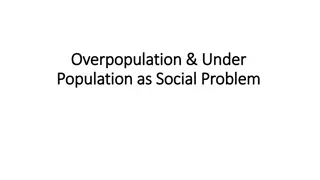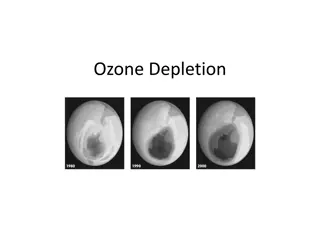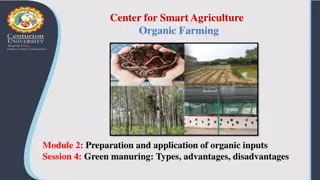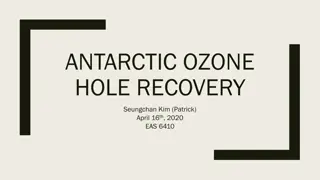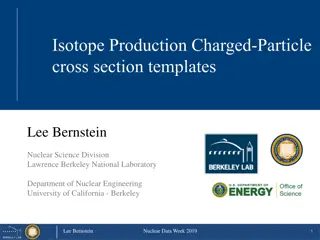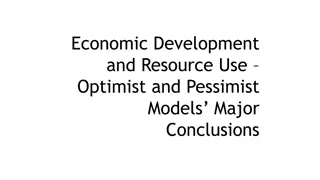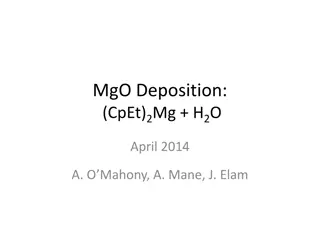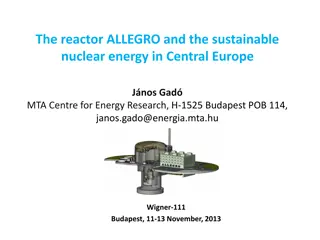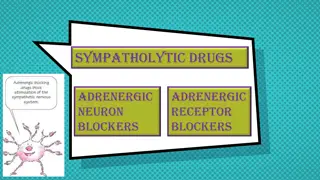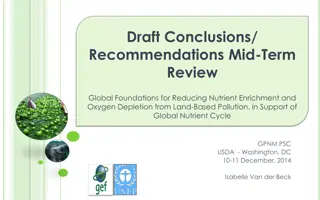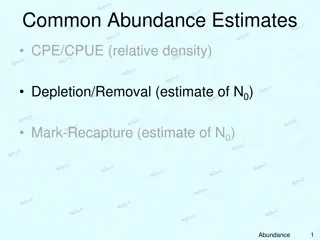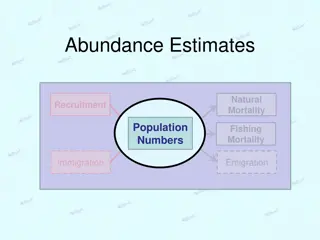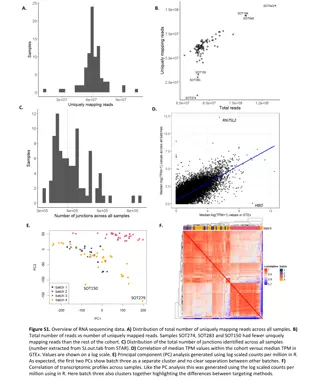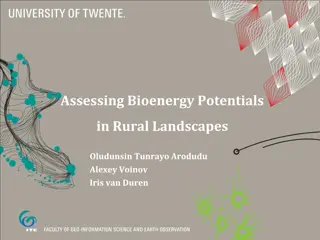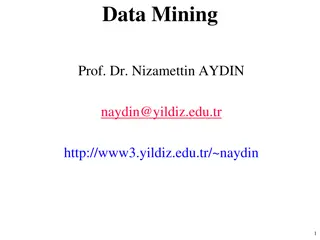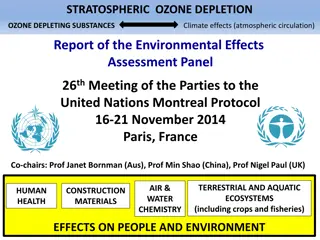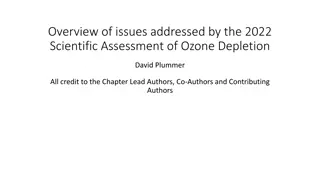Why Won't My VW Clutch Pedal Come Back Up Finding The Answer
Discover reasons behind your VW's clutch pedal sticking. Explore issues like faulty assembly, damaged cable, or fluid depletion. Seek professional inspection for accurate diagnosis and prompt resolution, ensuring smooth gear shifting and maintaining drivetrain integrity.
1 views • 26 slides
Forecasting the Future of the Waste Heat Recovery System Market: Trends and Fore
The waste heat recovery system market is expected to witness significant growth due to strict government regulatory requirements, increasing concerns about environmental protection, rising concern for energy prices, and the reluctant use of waste heat management technologies. Concerns about rising c
4 views • 4 slides
Maintaining Dissolved Oxygen Levels for Black Bass in Livewells
Dissolved oxygen is crucial for the health of black bass in livewells, especially during warmer months. This presentation explores the importance of oxygen equipment to maintain sufficient oxygen levels, recommends system components, and provides guidelines for installation, operation, and safety me
0 views • 14 slides
Understanding Acetaminophen Poisoning: Mechanism, Toxicity, and Treatment
Acetaminophen poisoning occurs when the body is overwhelmed by high doses of the drug, leading to liver toxicity and potentially fatal consequences. The mechanism of toxicity involves the depletion of glutathione and the formation of a harmful metabolite, N-acetyl-para-benzoquinoneimine (NAPQI). Con
2 views • 9 slides
Understanding Hypokalemia and Potassium Regulation
Hypokalemia is a condition characterized by low potassium levels, crucial for intracellular functions. The Na+/K+ ATPase pump maintains the ICF/ECF gradient. Potassium excretion occurs mainly via the kidneys, with minimal variation in proximal tubule reabsorption. The collecting duct plays a vital r
2 views • 50 slides
Understanding Overpopulation as a Social Problem
Overpopulation presents challenges such as resource depletion, poverty, illiteracy, and environmental hazards. Factors contributing to overpopulation include birth rates, poverty, illiteracy, lack of family planning, and immigration. Effects of overpopulation include strained natural resources, envi
0 views • 12 slides
Understanding Ozone Depletion: Causes and Impact
The ozone layer, found in the stratosphere at 15 to 40 km altitude, plays a crucial role in absorbing harmful ultraviolet radiation. However, due to the use of Chlorofluorocarbons (CFCs), the ozone layer has been depleted, leading to the formation of the ozone hole. This depletion is caused by chemi
0 views • 27 slides
Understanding Green Manuring in Organic Farming: Types, Advantages, and Disadvantages
Green manuring involves incorporating green plant tissues into the soil to enhance fertility and structure. This method includes types like in-situ and green leaf manuring. Desirable qualities of a good green manuring crop are quick growth, nutrient fixation, and deep root systems. Advantages includ
0 views • 7 slides
Sustainable Design Principles and Practices
Sustainable design focuses on minimizing resource depletion and environmental impact throughout a product's life cycle. It involves practices such as life cycle assessment, inventory, efficient manufacturing, eco-friendly distribution, and responsible product use and maintenance. By employing these
0 views • 15 slides
Fort Logan National Cemetery - Historical Overview and Future Expansion Plans
Fort Logan National Cemetery, located in Denver, Colorado, has a rich history dating back to its establishment in 1889. Originally a post cemetery, it was designated as a national cemetery in 1950. The cemetery has steadily expanded and currently ranks 11th out of 155 national cemeteries in terms of
2 views • 7 slides
Understanding P-N Junction and Semiconductor Physics
A p-n junction is a crucial interface in semiconductor devices that consists of a p-type and an n-type material, creating a boundary with distinctive charge carriers. By doping different semiconductor materials, a p-n junction can be formed, enabling the diffusion and drift of electrons and holes ac
0 views • 25 slides
Understanding Tunnel Diode: A High-Speed Solid-State Electronic Device
Tunnel diode, a heavily doped solid-state electronic device, displays negative resistance due to the phenomenon of Tunneling. It is utilized as a fast-switching component in computers, with germanium being a common material used to manufacture it. The depletion region's width in a tunnel diode is ex
0 views • 15 slides
Understanding IPv6 Addressing and Migration Techniques
IPv6 is designed as the successor to IPv4 due to the depletion of IPv4 address space. This lecture covers topics such as the need for IPv6, IPv4 and IPv6 coexistence techniques like dual-stack, tunneling, and translation, IPv6 addressing using the hexadecimal number system, and IPv6 address represen
0 views • 30 slides
Antarctic Ozone Hole Recovery and Future Challenges
Depletion of the stratospheric ozone layer in Antarctica due to chlorine emissions led to the formation of the ozone hole. Since the phasing out of Ozone-Depleting Substances (ODSs) under the Montreal Protocol, there has been a reduction in anthropogenic ODSs in the troposphere. Observations and che
0 views • 12 slides
Understanding Nutrient Recycling in Ecosystems
Nutrient recycling is a vital process where nutrients are continuously exchanged between living and non-living components of an ecosystem, ensuring efficient use and reuse of elements. Through decomposition and recycling, nutrients are released back into the environment, sustaining life cycles and p
6 views • 23 slides
Understanding Methods of Social Work
Methods of social work encompass various approaches aimed at enhancing social functioning and addressing problems in individuals and communities. These methods are categorized into primary and secondary methods, each serving different purposes in the field. Primary methods involve direct interaction
0 views • 20 slides
Isotope Production Charged Particle Cross Section Techniques
The process of measuring angle-integrated charged-particle cross sections using the stacked target technique is discussed. The method involves the use of monitor foils, degraders, and a beam foil of interest to determine energy and flux. Uncertainties in the measurements and the correction for flux
1 views • 3 slides
Economic Development and Resource Use: Optimist vs. Pessimist Models
The optimistic and pessimistic views on economic development and resource use present contrasting conclusions about the future. Pessimists warn of environmental degradation and resource depletion leading to a decline in population and living standards, while optimists believe in exponential growth i
0 views • 8 slides
Understanding Photodiodes: Operation, Types, and Symbols
A photodiode is a sensitive semiconductor device that converts light into electric current. Operating in reverse bias, it generates charge carriers in the depletion region using external energy sources such as light. Different types include PN junction, PIN, and avalanche photodiodes, each designed
1 views • 36 slides
Santa Cruz County Fire Department Contract Options Analysis
Santa Cruz County Fire Department is evaluating options for its contract with CAL FIRE to improve staffing efficiency and management. The current contract expires soon, and various considerations like decreasing Amador commitment, adding full-time staffing, and a hybrid model are being explored. Ass
2 views • 5 slides
Understanding Intergranular Corrosion and Sensitization in Materials Engineering
Intergranular corrosion (IGC) is a type of corrosion that targets the boundaries of crystallites in materials, making them more vulnerable to corrosion. This phenomenon, caused by impurities, enrichment, or depletion of alloying elements at grain boundaries, can lead to material degradation. Sensiti
0 views • 10 slides
Understanding Moving Averages and Exponential Smoothing Methods
Forecasting methods like moving averages and exponential smoothing are essential for analyzing time series data. Averaging methods involve equally weighted observations, while exponential smoothing methods assign unequal weights that decay exponentially. Both methods can be useful for forecasting in
0 views • 18 slides
Study on MgO Deposition Using (CpEt)2Mg and H2O
Investigation conducted in April 2014 on MgO deposition process using (CpEt)2Mg and H2O. Initial attempts showed non-uniformity, with subsequent optimization leading to uniform deposition on MCPs. Thickness measurements taken on Si and MCPs revealed reproducible results with slight depletion in prec
0 views • 8 slides
Advancing Sustainable Nuclear Energy in Central Europe with Fast Reactors
Explore the potential of G4 fast reactors for advancing sustainable nuclear energy in Central Europe. Learn how fast neutron spectrum reactors can help address uranium stock depletion, waste elimination, and fuel cycle closure. Discover the regional long-term solution proposed for V4 countries and t
0 views • 12 slides
Understanding Silicon Detector Technology
Silicon is a remarkable material with low energy requirements for creating e-hole pairs, long mean free paths, high mobility for fast charge collection, and well-developed technology for fine lithography. Silicon detectors operate based on carrier band diagrams, density of states, and Fermi-Dirac di
0 views • 21 slides
Understanding Adrenergic Neuron Blockers: Mechanisms and Pharmacological Effects
Explore the mechanisms of action of adrenergic neuron blockers and classify adrenergic receptor blockers into selective and non-selective categories. Delve into the pharmacokinetic aspects and pharmacodynamic effects of these blockers, such as false transmitter formation, store depletion, release in
0 views • 29 slides
Environmental Impacts of Tourism: Balancing Conservation and Development
Tourism plays a significant role in both damaging and preserving the environment. While tourism development can lead to negative impacts like resource depletion, water scarcity, and habitat loss, it also has the potential to raise awareness, contribute to conservation efforts, and fund the protectio
0 views • 20 slides
Addressing Misconceptions in Writing Across the Curriculum (WAC) Classes
WAC approaches in geology classes aim to correct persistent misconceptions through gateway activities, focusing on topics like CFCs and ozone depletion. By engaging students in discussions and written responses, educators correct prior misunderstandings to enhance learning outcomes and clarify disti
0 views • 6 slides
Understanding Ozone Depletion and Its Impact on the Environment
The stratosphere contains a vital layer of ozone that shields the Earth from harmful UV radiation. However, human activities, particularly the use of chlorofluorocarbons (CFCs), have led to the depletion of this protective ozone layer, especially over the poles. This thinning of ozone poses signific
0 views • 10 slides
Mid-Term Review on Nutrient Enrichment and Oxygen Depletion Reduction Strategies
The Mid-Term Review evaluated the effectiveness, efficiency, relevance, and sustainability of projects aimed at reducing nutrient enrichment and oxygen depletion from land-based pollution. Key findings highlighted successful pilot projects, the need for improved M&E reporting, and the importance of
0 views • 7 slides
Fisheries Abundance Estimates and Depletion Methods
Explore common abundance estimation techniques like CPUE, mark-recapture, and depletion methods. Understand how to calculate relative density, depletion estimates, and cumulative catch. Discover the concepts of N0, Nt, Ct, and q in depletion estimates using regression models. Learn about the assumpt
0 views • 10 slides
GEF Chemicals Management Overview & Strategies
GEF plays a crucial role in managing chemicals such as Persistent Organic Pollutants (POPs), Ozone Depletion Substances, and Mercury. With a total allocation of $425 million, GEF agencies work towards reducing POPs use, updating National Implementation Plans, and supporting countries in meeting obli
0 views • 11 slides
Understanding Abundance Estimates in Fisheries Management
Explore the concept of abundance estimates in fisheries management, including natural mortality, recruitment, population numbers, fishing mortality, immigration, and emigration. Learn about common abundance estimation methods like CPE/CPUE, depletion/removal estimates, and mark-recapture techniques.
0 views • 10 slides
Overview of RNA Sequencing Data: Insights from Transcriptomic Profiling
This data set presents key findings from RNA sequencing analysis, including distribution of mapped reads, junction identification, TPM correlation, principal component analysis, and gene expression effects. Visual representations illustrate differences in gene expression profiles across samples, emp
0 views • 6 slides
Assessing Bioenergy Potentials in Rural Landscapes: A Holistic Approach
This study focuses on assessing bioenergy potentials in rural landscapes to address climate change challenges and depletion of fossil fuel reserves. By developing a holistic approach, the research aims to consider various factors impacting bioenergy potential under an SEA framework. Exploring altern
0 views • 16 slides
Understanding Anomaly Detection in Data Mining
Anomaly detection is a crucial aspect of data mining, involving the identification of data points significantly different from the rest. This process is essential in various fields, as anomalies can indicate important insights or errors in the data. The content covers the characteristics of anomaly
0 views • 50 slides
Atmospheric Mercury Depletion Events in Arctic Regions
Explore the impact of atmospheric mercury depletion in polar regions during the Arctic spring. This presentation delves into the trajectory of mercury post-depletion, emphasizing environmental implications and mercury cycling theories. Discover how pollution in 53 streams is assessed and gain insigh
0 views • 17 slides
Impacts of Stratospheric Ozone Depletion on Ecosystems and Human Health: 2014 Assessment Report
Significant scientific advances in understanding the effects of stratospheric ozone depletion on ecosystems and human health were presented in the 2014 Assessment Report. The report assessed research covering various subject areas and highlighted the increased UV-B radiation levels due to ozone depl
0 views • 20 slides
Insights from 2022 Scientific Assessment of Ozone Depletion
The 2022 Scientific Assessment of Ozone Depletion, led by David Plummer, addresses key issues like Ozone Depleting Substances, HFCs, Global and Polar Stratospheric Ozone, Climate Impacts, Stratospheric Aerosol Injection, and more. Chapter details reveal decreasing trends in Ozone Depleting Substance
0 views • 12 slides
IPv6 Addressing and Coexistence: Overview and Challenges
This lecture covers essential topics on IPv6 addressing, including IPv4 issues, the need for IPv6, address representation, types, testing, and verification. It explains how IPv6 is designed to overcome the limitations of IPv4, particularly the depletion of the IPv4 address space. The discussion also
0 views • 44 slides


